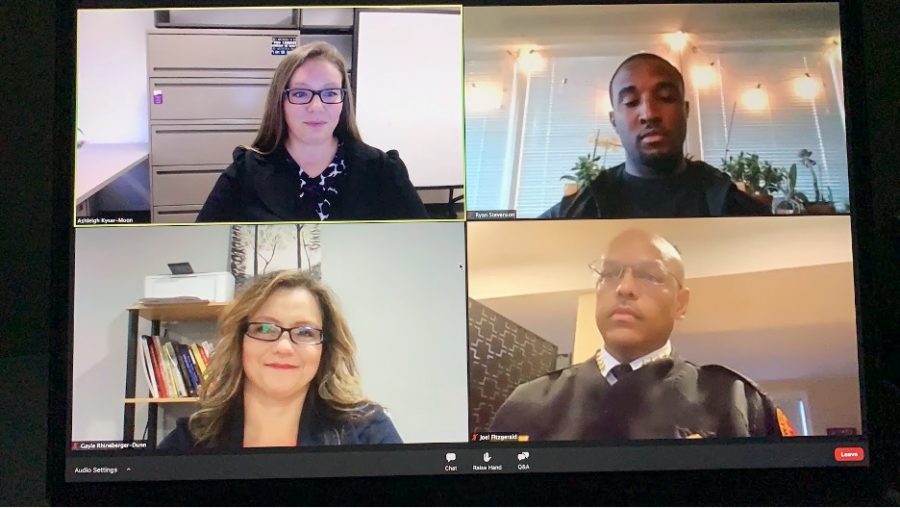Diversity Colloquium talks policing
The Department of Sociology, Anthropology, and Criminology hosted the October Diversity Colloquium, in which professors were joined by a local activist and the Waterloo Police Chief to discuss race, social justice and policing.
Oct 22, 2020
On Thursday, Oct. 15, UNI held a virtual panel that explored the intersections of race, social justice and policing in the United States and Cedar Valley. The panel served as the October Diversity Colloquium and was part of UNI’s “Cultivating Justice: A 6-Week Quest Toward Racial Equity.”
Panelists included UNI alumnus and local social justice activist Ryan Stevenson, who works for Congresswoman Abby Finkenauer, along with Waterloo Police Chief Joel Fitzgerald and professor of criminology Gayle Rhineberger. Ashleigh Kysar-Moon, assistant professor at the Department of Sociology, Anthropology and Criminology (SAC), served as moderator.
Kysar-Moon started off the discussion by stating that the Diversity Colloquium series was created by SAC in 2016 in response to police brutality incidents nationwide, specifically the protests that took place in Ferguson, Mo., after the death of Michael Brown.
She mentioned that five years later, the deaths of George Floyd and Breonna Taylor have left many people feeling that not much has changed. The three panelists felt that while there is a lot that still needs to be done, there is a drastic amount of change that has occurred.
Stevenson specifically mentioned the advancement of technology and use of camera phones to capture incidents of police brutality.
“What has long been the Black experience is now visualized for everyone,” he said.
According to Stevenson, the main issue which has not been addressed within police departments and unions across the nation is more cultural.
“You can look at police departments such as Minneapolis; a lot of things were within their policy already,” he said. “If you look at them as a department head, they have probably done a lot of the right things. But regardless of policy, the culture is still there.”
He said if there are no penalties for misconduct and brutality, then it continues to breed the cultural belief that perpetrators can “get away with it.”
Fitzgerald agreed with Stevenson. He discussed the massive upheaval in the law enforcement community, which, from his perspective, stems from the case of Trayvon Martin, a Black 17-year-old who was fatally shot by George Zimmerman in Stanford, Fla. He said that simply placing a policy without integrating it into the culture of the place is detrimental for society.
“It takes a lot of courage for one to come into an organization and promote the kind of cultural and paradigm shift needed to create the culture of accountability, and (some) leaders aren’t willing to do that today,” Fitzgerald said.
He added that because of this, situations arise in which the community believes that the police do whatever they like to do without repercussion, forcing police officers to defend their entire industry.
“I think that there are leaders out there now that want to do the right thing and want to change the face of policing,” he said. “This should never be seen as an attack on policing, but rather a movement towards shaping policing more in the vision of what the community sees as a police department.”
Rhineberger emphasized the importance of talking about race, especially for white people.
“By not talking about race, we’re actually saying it doesn’t matter, and we need to intentionally talk about it,” she said.
According to Rhineberger, too often parents try to raise “colorblind” children, hoping that this will prevent them from becoming racist, but often it causes more problems than it does good. She said it is imperative for parents to talk to their children about race and color to help them better reflect and understand.
In her classes, Rhineberger said she wants to ensure that her students understand implicit bias and are able to self-reflect.
“Until our white population looks into the mirror and (starts) being honest about what they have done, even if they don’t want to be, because most people don’t want to be racist, there isn’t going to be much of a change,” she said.
Although the panel was centered around issues in policing, panelists agreed that policing is just one part of a larger systemic problem. Rhineberger mentioned that issues concerning quality of life, such as mental health, drug treatment programs, violence programs and homelessness, should not fall under the police department’s jurisdiction, as police do not have the academic or the professional training to handle all of these issues.
Fitzgerald also mentioned issues within education, stating that he felt that many historical issues relevant to the modern conversation around racism and social justice are not adequately taught in schools.
“I remember learning about slavery but never about Juneteenth,” he said.
Future Diversity Colloquia for the rest of the semester are still to be determined, but more information may be found at https://csbs.uni.edu/sac/diversity-colloquium-series.








